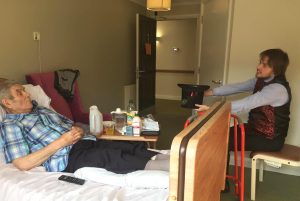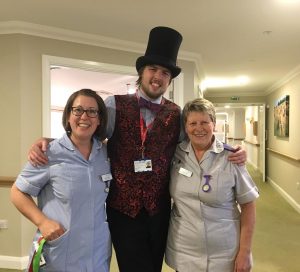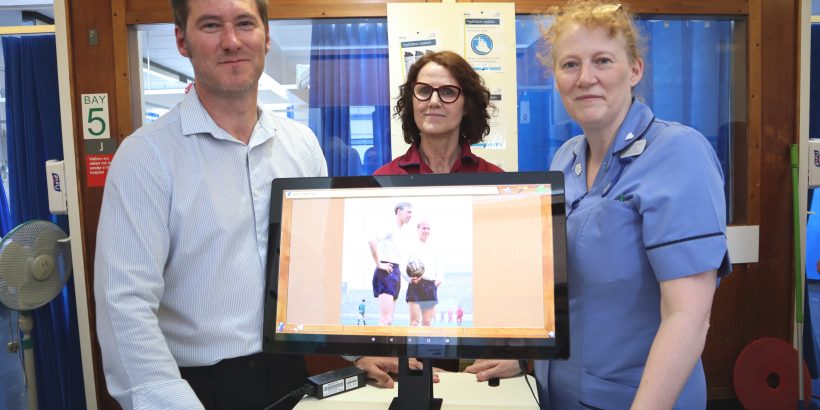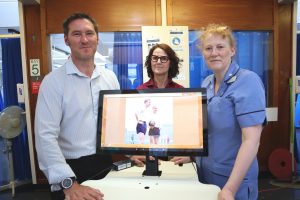 These systems, called RITA (reminiscence interactive therapy activities), allow patients to look through archived photographs, video clips, relaxing music, and even play interactive games and quizzes while in hospital.
These systems, called RITA (reminiscence interactive therapy activities), allow patients to look through archived photographs, video clips, relaxing music, and even play interactive games and quizzes while in hospital.
Maggie Woodhouse, dementia trainer at WSFT, said: âWe try to make a hospital stay as comfortable as possible for all our patients, but some of our particularly vulnerable patients need a little extra support to feel at ease in an unusual environment, such as our patients who have dementia.
âRITA is an easy-to-use digital tool which encourages conversations between staff, visitors and patients; helping patients, particularly those with dementia, to recall memories, and interact. It has also been effective in calming distressed or anxious patients, whatever their age or condition, and can be used by patients themselves or with help from nurses, therapists, family and carers.â
Around one in four inpatients at the West Suffolk Hospital have dementia, so being dementia-friendly and aware is crucial to patient care across the Trust.
Hospital is an unfamiliar place to most patients who are admitted, but for patients with dementia this unfamiliarity can be even more distressing. A number of wards at the West Suffolk Hospital have been made dementia-friendly environments, with different coloured bays to help patients distinguish areas, signage with visual picture signs to help patients find their way round, and stickers of flowers and decorative photos on glass and windows to ensure patients are aware of the solid objects in front of them. As wards are redecorated and updated, they will each be made dementia friendly.
 The Trust also has one of the longest hospital memory walks in the country, funded by its My WiSH Charity Forget-Me-Not dementia campaign. The walk is made up of images spanning four decades from the 1950s to the 1980s, including local landmarks, and the campaign has raised more than £100,000 to date.
The Trust also has one of the longest hospital memory walks in the country, funded by its My WiSH Charity Forget-Me-Not dementia campaign. The walk is made up of images spanning four decades from the 1950s to the 1980s, including local landmarks, and the campaign has raised more than £100,000 to date.
Hospital volunteers also support patients with dementia, interacting with patients through crafts such as crochet, and knitted âtwiddle-muffsâ. Maggie commented: âPatients with dementia sometimes need something to occupy their agitated hands and twiddle-muffs can both soothe and keep hands warm at the same time.â
On the King Suite wing of Glastonbury Court care home, WSFT patients are cared for after a stay at West Suffolk Hospital to recover before they are discharged home. A volunteer âstorytellerâ, Joshua Harris, 31, from Bury St Edmunds, visits inpatients two or three times a month to bring them fun and laughter, but also to listen to their stories too: âI wanted to find a way of giving back to the community, and to bring some joy to others, and I thought this was a way of using my hobby to do something good.
âI donât see myself as interacting with patients â Iâm interacting with people. As well as sharing folk tales and myths with people, Iâve heard plenty of their stories, for example about Dunkirk, and even what it was like to grow up in London in the same street as the Kray twins!
âIf I can bring a bit of enjoyment to someoneâs evening then itâs worth it. The real heroes, though, are the NHS staff. Theyâre busy, but do an amazing job.â
Julie Fountain, lead nurse for dementia and frail elderly at WSFT, said: âMost of our dementia initiatives are put in place to encourage our patients with dementia to talk about their lives and interact with others, to calm them and make them more comfortable in the world around them.
âFor Dementia Action Week this year (20 – 26 May), the Alzheimerâs Society asked people to start a conversation with someone who has dementia, as two-thirds of people living with dementia report feeling isolated and lonely. Because of the support of our charities, our community and our proactive staff and volunteers, we like to think we are helping to facilitate conversations with all our patients all year round.
âWeâre so grateful to our hospital charities for supporting patients with dementia in our Trust â it cost around £20,000 to purchase this wonderful equipment, but the difference it has made to patients is worth every penny. A big thank you to our Friends Shop volunteers and the customers who purchase items from there â without them we could not have bought these brilliant digital systems.â
If you would like to donate to the hospitalâs My WiSH Charity please email: fundraising@wsh.nhs.uk or call 01284 712952.
For more information about the Friends of The West Suffolk Hospital, how you can get involved, donate, or volunteer, please visit their website: www.friendsofwsh.co.uk
If you would like to volunteer at West Suffolk Hospital please contact voluntary services: Telephone: 01284 713169 or email: voluntary.services@wsh.nhs.uk


